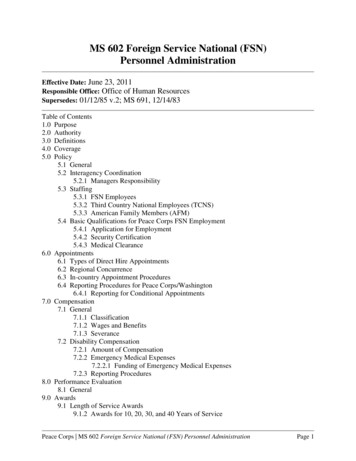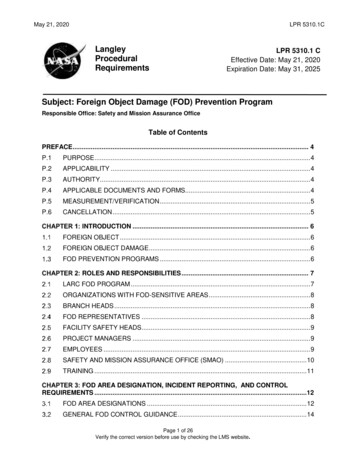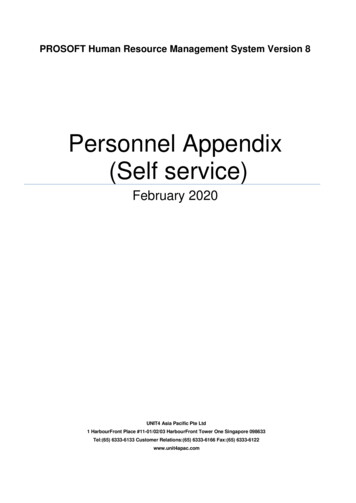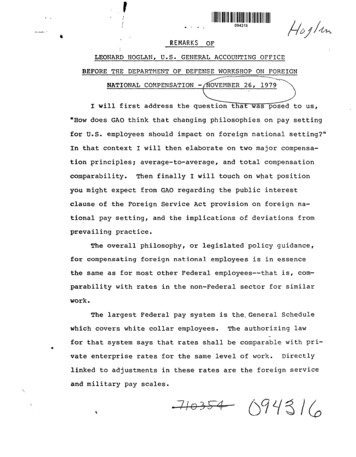
Transcription
MS 602 Foreign Service National (FSN)Personnel AdministrationEffective Date: June 23, 2011Responsible Office: Office of Human ResourcesSupersedes: 01/12/85 v.2; MS 691, 12/14/83Table of Contents1.0 Purpose2.0 Authority3.0 Definitions4.0 Coverage5.0 Policy5.1 General5.2 Interagency Coordination5.2.1 Managers Responsibility5.3 Staffing5.3.1 FSN Employees5.3.2 Third Country National Employees (TCNS)5.3.3 American Family Members (AFM)5.4 Basic Qualifications for Peace Corps FSN Employment5.4.1 Application for Employment5.4.2 Security Certification5.4.3 Medical Clearance6.0 Appointments6.1 Types of Direct Hire Appointments6.2 Regional Concurrence6.3 In-country Appointment Procedures6.4 Reporting Procedures for Peace Corps/Washington6.4.1 Reporting for Conditional Appointments7.0 Compensation7.1 General7.1.1 Classification7.1.2 Wages and Benefits7.1.3 Severance7.2 Disability Compensation7.2.1 Amount of Compensation7.2.2 Emergency Medical Expenses7.2.2.1 Funding of Emergency Medical Expenses7.2.3 Reporting Procedures8.0 Performance Evaluation8.1 General9.0 Awards9.1 Length of Service Awards9.1.2 Awards for 10, 20, 30, and 40 Years of ServicePeace Corps MS 602 Foreign Service National (FSN) Personnel AdministrationPage 1
10.011.012.013.09.2 Incentive Awards9.2.1 Cash Awards9.2.2 Amount of Cash Award for Sustained Outstanding job Performance9.2.3 Amount of Cash Award for Suggestions Resulting in Improved OperationsSeparation10.1 General10.2 Types of Separations10.2.1 Separations for causeTraining11.1 Staff Training Cycle in Washington11.1.2 Health Insurance While in the United States for TrainingDetail of Host Country Nationals to Peace Corps12.1 Salary and Benefits12.2 Other Factors12.2.1 Security Clearance12.2.2 Conflict of Interest12.2.3 Vehicle Insurance12.2.4 Service to Host Country Government During Time of Detail12.3 Peace Corps/Washington Reporting Procedures12.4 Regional ApprovalEffective Date1.0 PurposeThis Manual Section describes the personnel management policies and authorities for PeaceCorps Foreign Service National (FSN) employees.2.0 AuthorityThe basic authority for the appointment of Peace Corps employees, including FSN employees, isfound in Section 7(a) of the Peace Corps Act (22 U.S.C. 2506 (a)).Peace Corps personnel policy for FSN employees is set forth in the PC MS 602 Foreign ServiceNational (FSN) Personnel Administration, MS 603 Direct Hire Position Classification, and inthe Foreign Affairs Manual (3FAM), section 900.3.0 Definitions(a)Foreign Service National (FSN) Position. An FSN position is a slot which may be filledby a Foreign Service National (FSN) employee, a Third Country National (TCN)employee or an American Family Member (AFM) employee. The number of FSNpositions at Post must be coordinated with the Chief of Mission at Post. Additions orreductions in the number of FSN positions require the concurrence of the Chief ofPeace Corps MS 602 Foreign Service National (FSN) Personnel AdministrationPage 2
Mission at Post and the Regional Director. Notification of change is coordinated throughthe Office of Human Resources (HR) and the U.S. State Department.(b)Foreign Service National (FSN) Employee. An FSN employee is a host country nationalhired to fill an FSN position. The time worked by FSN employees counts against the FTE(Full Time Equivalent) numbers of the Post and the Region.4.0 CoverageAlthough Peace Corps' general personnel policy toward FSN employees in Micronesia isconsistent with its policy elsewhere, the absence of U.S. embassies in Micronesia makes itnecessary for Peace Corps to establish Micronesia specific FSN policies and procedures.Personnel policy and guidelines for Peace Corps Micronesia FSN staff are covered in the PeaceCorps Micronesia FSN Personnel Manual.5.0 Policy5.1GeneralPeace Corps continues to acknowledge the importance of Foreign Service National employees inthe conduct of its mission overseas. Because the five year rule affecting U.S. direct hire andresident hire staff does not apply to non U.S. citizens, the employment and retention of qualifiedFSN staff is crucial to the continuity and stability of the program.5.2Inter-Agency CoordinationForeign Service National employees of the Peace Corps are covered by the same rules,regulations, and guidelines as those covering FSN employees of the U.S. Department of State,AID, USIA and other United States Government agencies that employ Foreign ServiceNational employees abroad under the provisions of the Foreign Service Act of 1980. (See 3 FAM900.)5.2.1 Managers ResponsibilityAll Peace Corps managers are expected to take an active role in inter-Agency affairs affectingFSN employees. This includes, but is not limited to, participation and leadership in policygroups, compensation review and appeals panels and committees, incentive award committees,and salary survey teams.5.3StaffingStaffing at an overseas Peace Corps Post has been and will continue to be a mix of American andFSN employees. Professional level programming and/or resources management jobs may befilled by either FSN employees or American employees, e.g., the lead employee for Agricultureprogramming may be an FSN employee in one country and an American in another. Generally,the support positions are filled by FSN employees.Peace Corps MS 602 Foreign Service National (FSN) Personnel AdministrationPage 3
5.3.1 FSN EmployeesThe employment of FSNs at Peace Corps Posts makes closer and more meaningful relationshipspossible between Peace Corps and the host country people and host country governments. Suchpersonnel bring to their assignments, in addition to expertise, a sensitivity available only to thosewho are fully a part of the host culture.5.3.2 Third Country National Employees (TCNs)The employment of Third Country Nationals (TCNs) to fill FSN positions is discouragedbecause the cross-cultural exchange between the FSN staff of the host country and the PeaceCorps is important to the mission of the Peace Corps in that country. Additionally, there arecomplications with visas, work permits, and long term benefits such as host country socialsecurity programs. (See 3 FAM 927 for details.)5.3.3 American Family Members (AFM)The employment of American Family Members (AFMs) to fill FSN positions is discouragedexcept for very short term or unusual needs. Again, cross cultural exchange between the FSNstaff of the host country and the Peace Corps is important to the mission of the Peace Corps inthat country. Authorization to use the AFM program must be obtained in advance from theOffice of Human Resources (HR). HR will obtain the concurrence of the Associate Directorsfrom the Office of Management and Office of Global Operations prior to authorizing the use ofan AFM employee. (See 3 FAM 122.8 for details.)5.4Basic Qualifications for Peace Corps FSN Employment5.4.1 Application for EmploymentCandidates must complete an "Application for Employment in the Foreign Service of the UnitedStates" (Form OF-174) and submit the form to the U.S. Embassy Personnel Office or to thePeace Corps Country Director for transmittal to the U.S. Embassy.5.4.2 Security CertificationA Foreign Service National (FSN) hire is required to have a security and suitability investigationconducted by the Regional Security Officer (RSO) or Post Security Officer (PSO) at theservicing U.S. Embassy in accordance with 3 FAM 7222. An FSN may not be appointed until atleast a temporary security certification, good for 120 days, has been issued by theRSO/PSO. The RSO/PSO may issue extensions of the initial 120-day temporary securitycertification. Additionally, the RSO/PSO must conduct an update investigation every five yearsfor the purpose of reissuing the security certification. Contact the RSO/PSO for instructions andappropriate forms. Refer to MS 691, Guidelines for Employment of Foreign Service Nationalsby Direct Hire and Detail.5.4.3 Medical ClearancePeace Corps MS 602 Foreign Service National (FSN) Personnel AdministrationPage 4
Medical clearance must be obtained prior to reporting for duty. The medical examinations areconducted by the Department of State Regional Medical Officer (RMO) at Post or the designatedDepartment of State Medical physician, in those cases where there is no RMO. The examiningphysician determines whether the applicant meets the minimum physical requirements of theposition.6.0 Appointments6.1Types of Direct Hire AppointmentsFollowing are the types of direct hire appointments:(a) Temporary – appointment for duration of one year or less.(b) Limited – appointment for duration of more than one year, but less than five years.(c) Indefinite – appointment with no specific time limit, which requires that the employeeparticipate in a host country social security plan.(d) Conditional – appointment with no specific time limit, which requires the employee'sparticipation in the U.S. Civil Service Retirement and Disability Systems (CSR).Conditional appointments are appropriate only at Posts which had the authority to offerparticipation in the CSR. (NOTE: U.S. Civil Service Retirement System is underrevision. New enrollments are not being made at present.)6.2Regional ConcurrencePositions to be filled by FSN direct-hire employees must be in compliance with budget and FTErequirements approved by the Regional Director. The Country Director is the selecting official atPost. Country Directors must receive concurrence from the Regional Director unless suchconcurrence is waived by the Regional Director on the following:(a) Proposed position assignment;(b) Proposed grade and salary; and(c) Proposed entry-on-duty date.6.3In-country Appointment ProceduresThe recruitment and appointment processes are coordinated with the U.S. Embassy at Post. ThePersonnel Officer and/or Administrative Officer will provide assistance to the Country Directorin these matters. At Peace Corps Posts where the Embassy is in another geographic location, theCountry Director will have a greater direct role in recruitment and selection. However, in bothcases, the personnel processing functions and records maintenance functions are theresponsibility of the U.S. Embassy.6.4Reporting Procedures for Peace Corps/WashingtonPeace Corps MS 602 Foreign Service National (FSN) Personnel AdministrationPage 5
Employment of Foreign Service National Employees is reported to PC Washington by cable.6.4.1 Reporting for Conditional AppointmentsAll FSN positions which are part of the U.S. Civil Service Retirement and Disability Systemrequire that the following be sent to Accounting Division (M/FM/A):(a) A copy of the Notification of Personnel Action (SF-50).(b) All subsequent notification of personnel action, e.g., promotion, pay adjustment, transfer,and separation.(c) Form FS-415, "Annual Reconciliation of Payroll Deductions" will be provided by theappropriate Finance Center for each FSN employee participating in the CSR system.7.0 Compensation7.1GeneralForeign Service National employees will receive compensation and employee benefits inaccordance with Section 408 of the Foreign Service Act of 1980, which requires theestablishment of a compensation plan based on prevailing wage rates and local compensationpractices. All agencies at each Post that hire FSNs under the provisions of the Foreign ServiceAct of 1980 are covered by the same compensation plan.7.1.1 ClassificationPeace Corps FSN positions are classified in accordance with the interagency guidelines asdetailed in the Local Employee Classification Handbook. Within the handbook, there are PeaceCorps specific classification standards, Peace Corps Program Series, #4020. More detailedinformation on the classification of FSN positions can be found in the 3 FAN 930 and the PeaceCorps MS 603, Position Classification.7.1.2 Wages and BenefitsSalary and benefit plans are developed for each country based upon surveys of the wages andbenefits provided by other employers in the country. There are three types of survey:(a) Basic – a full-fledged wage and benefit survey conducted by contractors. This is doneevery 4-5 years or as the needs of the country dictate.(b) Salary change – a more simplified procedure conducted by the Post. Generally, thisshould be done on an annual basis or more often if the need arises.(c) Spot-check – a survey procedure used to update existing data. This may be used asfrequently as needed.Peace Corps MS 602 Foreign Service National (FSN) Personnel AdministrationPage 6
The guidelines for collecting the data and constructing the plan are found in the InteragencyHandbook on Foreign Service National Employee Compensation. Additional information on thetiming and implementation of the surveys can be found in 3 FAN 930.7.1.3 SeveranceAll FSN compensation plans should include a severance pay plan which is administered incompliance with local law. The plan should include rules covering employee eligibility,creditable service, amount of payments, notice period required, and circumstances under whichseverance is or is not granted.7.2Disability CompensationAn FSN employee who suffers illness or sustains an injury in the performance of duty may beentitled to compensation under the provisions of the Federal Employee's Compensation Act (5U.S.C. 8101-8150) as administered by the Department of Labor's Office of Workers'Compensation Program (OWCP).7.2.1 Amount of CompensationAs determined by OWCP, an FSN employee will be compensated in accordance with the benefitprovisions of local law or custom of the country; or in accordance with special schedulespromulgated by OWCP for citizens of a specified country.7.2.2 Emergency Medical ExpensesThe Country Director may make emergency payments of medical expenses which will then bereimbursed by the OWCP upon certification that the treatment for which payments were madewas for injury sustained in the performance of duty and that such injury was not caused by thewillful misconduct of the employee or by the employee's intention to bring about injury to self,and that intoxication was not the proximate cause of the injury.7.2.2.1 Funding of Emergency Medical ExpensesPayment of emergency medical expenses should be charged to the Peace Corps account used formedevacs and other medical expenses of U.S. direct hire personnel overseas. Documentationrequired for reimbursement from OWCP consists of two copies of paid vouchers or bills whichshow the full name of the injured employee, date of injury, dates of treatment, character ofservices, amounts for each, name of doctor, hospital or vendor furnishing the services orsupplies, translated into English at Post.7.2.3 Reporting ProceduresReporting job related illness or injury for FSN employees is the same as that outlined in MS 682,"Safety and Health Program" with three exceptions: one, when reporting salary on the claimsforms, indicate the base salary plus any bonus payments not included in the base figure; two,include a current exchange rate; and three, send along a copy of local labor laws whenPeace Corps MS 602 Foreign Service National (FSN) Personnel AdministrationPage 7
applicable. OWCP claims are coordinated through the Office of Medical Services, HealthBenefits and Analysis Division (M/MS/HB).8.0 Performance Evaluation8.1GeneralSupervisors have a continuous responsibility to evaluate the performance of their employees andto discuss the evaluation with the employees. The evaluation process is on-going and shouldinclude discussion with the employee throughout the year. On an annual basis, the supervisor isrequired to prepare a written performance evaluation. The written evaluation will be done usingthe Performance Evaluation Report form, JF- 50. Additional information on process andprocedure can be found in 3 FAM 960.9.0 Awards9.1Length of Service AwardsThe length of service award gives official recognition to creditable service with the U.S.Government. Service computation dates are computed and maintained by the Posts.9.1.1 Awards for 10, 20, 30, and 40 Years of ServiceCertificates to FSN employees completing the designated number of years of service will berequested from the Office of Human Resources (HR) at Peace Corps Headquarters inWashington, D.C. Information required for completion is: name, number of years of service to berecognized, and the month and year the service was completed. Certificates will be signed by theDirector and returned to Post. Where possible, the Peace Corps should participate in interAgency award ceremonies at Post.9.2Incentive AwardsThe purpose of the Interagency Incentive Award program is to encourage FSN employees toparticipate actively in improving Peace Corps operations; recognize and reward employees forsuggestions, superior accomplishments or other personal efforts which will reduce costs orsimplify operations; and recognize and reward FSN employees for sustained outstanding workperformance. (See 3 FAN 640 for additional details.)9.2.1 Cash AwardsNominations for awards to FSN employees should be initiated by the Country Director. Thenomination should be prepared on Form DS-1577, "Nomination for Incentive Award", andsubmitted to the Joint Awards Committee, of which the Country Director should be a member, atPost for review and concurrence. If the committee concurs with the award or in those caseswhere there is no committee at Post, the nomination should be forwarded to the Office of HumanResources (HR) for review and approval. The Office of Human Resources at Peace CorpsPeace Corps MS 602 Foreign Service National (FSN) Personnel AdministrationPage 8
Headquarters in Washington, D.C., administers the Incentive Awards program for the PeaceCorps. Decisions to approve or not approve the award are made by an Incentive AwardsCommittee consisting of the three Associate Directors or their designees, the Chief HumanCapital Officer in the Office of Human Resources, a union representative, and the IncentiveAwards Administrator.9.2.2 Amount of Cash Award for Sustained Outstanding Job PerformanceRecommendations for awards for sustained outstanding job performance range from 1 1/2 to 10percent of annual salary.9.2.3 Amount of Cash Award for Suggestions Resulting in Improved OperationsThe criteria used for determining the amount are based on the level of the benefit to the PeaceCorps:(a) Moderate – Contribution limited in scope either as to number of employees or nature ofprogram affected, 25 - 100.(b) Substantial – Contribution which is an important improvement affecting minor programsor contributions involving important changes in methods or property, 100 - 200.(c) High – Contribution affecting significant phases of the entire Peace Corps Post operationsor which involve major changes in methods, 200 - 400.(d) Exceptional – Contribution materially affecting substantial or significant phases of theAgency's overall program or of outstanding services in the public interest, 400 - 800.10.0 Separation10.1 GeneralUnder the authority of section 612 of the Foreign Service Act of 1980, an FSN employee may beseparated at any time in light of criteria and procedures normally followed in the locality insimilar circumstances and in accordance with local law. A separation notice period should beestablished which conforms to local prevailing practice.An FSN employee may be separated without advance notice if:(a) The Country Director in consultation with the U.S. Embassy, determines that thecontinued employment of the employee presents a security threat to the U.S.,(b) The final results of a security and suitability investigation are adverse andrecommendation for separation is made by the regional security officer, or(c) Where permitted by local law. (See 3 FAM 974.)Peace Corps MS 602 Foreign Service National (FSN) Personnel AdministrationPage 9
10.2 Types of SeparationsEmployees may be separated for: 1) cause, 2) disqualification, 3) age, 4 reduction in force, 5)abandonment of position, 6) disappearance, 7) military service, 8) disability or 9) death. Generalguidelines on separations are found in 3 FAM 974 and specific guidelines will be found at eachPost. Local labor laws, local practices and customs will be followed to the extent feasible in thespecific guidelines for each Post.10.2.1 Separations for causeCountry Directors must consult with the Office of General Counsel, Peace Corps, whenproposing a separation for cause.11.0 TrainingFSN employees are encouraged to obtain training on the job, from local schools and universitiesand through correspondence courses. Additionally, FSN employees are nominated for attendanceat staff training cycles at Peace Corps/Washington.11.1 Staff Training Cycle in WashingtonCountry Directors will select FSN employees for participation in staff training in Washington.The number of nominations per year will depend upon the availability of funds, the needs of thePeace Corps Post and the potential benefit to the nominee and to the Agency. The Peace Corpscountry budget is used for FSN staff training expenses.11.1.1 Health Insurance While in the United States for TrainingThe Peace Corps Act, Section 10 (h) allows the Peace Corps to provide for hospitalization andmedical treatment for FSN employees while in the U.S. for training. The Peace Corps Office ofHuman Resources (HR) purchases a special health insurance policy for FSN employeesscheduled for Washington Staff Training. The coverage is for illness or injury incurred duringtravel to Washington, the time in Washington and at other designated training sites, and return toPost.12.0 Detail of Host Country Nationals to Peace CorpsCountry Directors should encourage host country governments to provide personnel onassignment or detail to the Peace Corps as a form of host country contribution. If a host countrygovernment is unable to detail such personnel at its own expense, the Country Director mayagree to provide partial or full reimbursement to the host government Agency without affectingFTE.Peace Corps MS 602 Foreign Service National (FSN) Personnel AdministrationPage 10
12.1 Salary and BenefitsBefore agreeing to reimburse a host country government for the cost of detailing one of itsemployees, the Country Director should determine the salary and benefits the individual isreceiving from the government and what the individual could command in the local labormarket. The Peace Corps should pay no more than the individual's prior rate of compensation.Moreover, if the individual's government compensation rate significantly exceeds what theindividual could command in the local market, this factor should be weighed in fixing theamount of reimbursable costs the Peace Corps will pay.While the individual is on detail to the Peace Corps, the ministry or government Agency willremain responsible for the employee's standard benefits such as health insurance, annual leave,or retirement benefits. It is the Country Director's responsibility to ensure that the detailedemployee does not unknowingly forfeit these benefits by accepting a detail with the PeaceCorps.Finally, the reimbursable costs for the detail of a host country national should be compared to thelevel of compensation that would be paid an FSN under direct-hire procedures. If reimbursablecosts of the detail exceed the maximum level that would be paid under the U.S. local employeecompensation plan, the Country Director must keep documentation of this on file demonstratingthat the detail is not a device to avoid a direct hire.12.2 Other Factors12.2.1 Security ClearanceThe Post Security Officer will conduct pre-employment investigations for personnel to bedetailed in accordance with 3 FAM 922.2. Detailed personnel (like direct-hire) cannot be givenaccess to classified material. With security clearance, they may have access to Peace Corpsgeneral administratively controlled material.12.2.2 Conflict of InterestThe Country Director must be sensitive to situations involving, or appearing to involve, conflictsof interest between a detailed individual's responsibilities toward the Peace Corps and toward thehost government Agency.12.2.3 Vehicle InsuranceIf detailed host country nationals are expected to operate Peace Corps vehicles in connectionwith their assignments, the Country Director shall determine whether host country law requiresthe Peace Corps to purchase liability insurance locally. If the detailed employee is expected tooperate host country government owned vehicles in connection with his or her Peace Corpsassignments, the host country government's written assumption of responsibility must besecured.12.2.4 Service to Host Country Government during Time of DetailPeace Corps MS 602 Foreign Service National (FSN) Personnel AdministrationPage 11
During periods of detail to the Peace Corps, host country personnel may not perform employeeservices for their government which are unrelated to their Peace Corps duties.12.3 Peace Corps/Washington Reporting ProceduresThe Country Director will forward to the Regional Director the following information for eachprofessional host country national whose detail from the host country government is proposed:(a) Proposed position assignment;(b) Biographical summary;(c) Proposed detail arrangements with the host country government Agency;(d) Proposed costs to the Peace Corps, if any, and justification for the proposed salary if itexceeds country norms; and(e) Value of host country contributions due to the detail.12.4 Regional ApprovalThe Regional Director must approve or disapprove the proposed detail.13.0 13.0 Effective DateThis Manual Section takes effect on the date of publication.Peace Corps MS 602 Foreign Service National (FSN) Personnel AdministrationPage 12
Peace Corps MS 602 Foreign Service National (FSN) Personnel Administration Page 1 MS 602 Foreign Service National (FSN) Personnel Administration Effective Date: June 23, 2011 Responsible Office: Office of Human Resources Supersedes: 01/12/85 v.2; MS 691, 12/14/83 Table of Contents 1.0 Purpose 2.0 Authority 3.0 Definitions 4.0 Coverage










